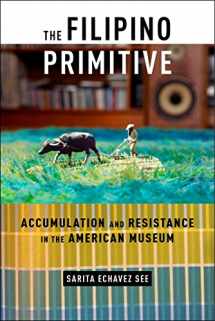
The Filipino Primitive: Accumulation and Resistance in the American Museum
ISBN-13:
9781479842667
ISBN-10:
1479842664
Author:
Sarita Echavez See
Publication date:
2017
Publisher:
NYU Press
Format:
Hardcover
272 pages
Category:
Criticism
,
Arts History & Criticism
,
Popular Culture
,
Social Sciences
FREE US shipping
Book details
ISBN-13:
9781479842667
ISBN-10:
1479842664
Author:
Sarita Echavez See
Publication date:
2017
Publisher:
NYU Press
Format:
Hardcover
272 pages
Category:
Criticism
,
Arts History & Criticism
,
Popular Culture
,
Social Sciences
Summary
The Filipino Primitive: Accumulation and Resistance in the American Museum (ISBN-13: 9781479842667 and ISBN-10: 1479842664), written by authors
Sarita Echavez See, was published by NYU Press in 2017.
With an overall rating of 3.7 stars, it's a notable title among other
Criticism
(Arts History & Criticism, Popular Culture, Social Sciences) books. You can easily purchase or rent The Filipino Primitive: Accumulation and Resistance in the American Museum (Hardcover) from BooksRun,
along with many other new and used
Criticism
books
and textbooks.
And, if you're looking to sell your copy, our current buyback offer is $0.3.
Description
How museums’ visual culture contributes to knowledge accumulation Sarita See argues that collections of stolen artifacts form the foundation of American knowledge production. Nowhere can we appreciate more easily the triple forces of knowledge accumulation—capitalist, colonial, and racial—than in the imperial museum, where the objects of accumulation remain materially, visibly preserved. The Filipino Primitive takes Karl Marx’s concept of “primitive accumulation,” usually conceived of as an economic process for the acquisition of land and the extraction of labor, and argues that we also must understand it as a project of knowledge accumulation. Taking us through the Philippine collections at the University of Michigan Natural History Museum and the Frank Murphy Memorial Museum, also in Michigan, See reveals these exhibits as both allegory and real case of the primitive accumulation that subtends imperial American knowledge, just as the extraction of Filipino labor contributes to American capitalist colonialism. With this understanding of the Filipino foundations of the American drive toward power and knowledge, we can appreciate the value of Filipino American cultural producers like Carlos Bulosan, Stephanie Syjuco, and Ma-Yi Theater Company who have created incisive parodies of this accumulative epistemology, even as they articulate powerful alternative, anti-accumulative social ecologies.


We would LOVE it if you could help us and other readers by reviewing the book
Book review

Congratulations! We have received your book review.
{user}
{createdAt}
by {truncated_author}


